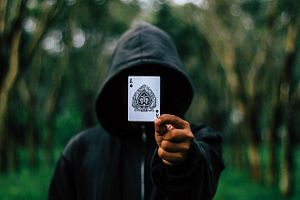In April’s inter-Korean summit, North Korea indulged South Korean people with a somewhat bizarre display: a magic trick.
The North Korean magician, who performed at the dinner venue after the summit, reportedly received a big welcome and loud applause when he demonstrated his skill by changing a 50,000 South Korean won bill into a $100 bill. Kim Yong Chol, the vice-chairman of the North’s Central Committee, took part in the performance as an assistant.
There are many unknowns about North Korea, and its magic industry is undoubtedly one of them.
In North Korea, a magic show is considered to be part of the circus, locally known as “Kyoye,” which is conducted by professional circus groups. According to North Korean culture critic Lim Chae-wook, North Korea provides government-level support to bolster its circus group. It is considered to be a performance art in the North, and circus players, including magicians, are given the title of “Kyoye actor,” he said. On average, one circus group can have up to 100 Kyoye actors.
Most of these performers began training as young as 10 years old at specially designed training institutions, Lim added. Actors at North Korea’s most prestigious circus group Pyongyang Circus, for instance, are trained at Pyongyang Circus School, which was established in 1975.
Candidates enter the school, where they spend about nine years before they get to perform. The school offers training in four different categories, and one of them is magic tricks, Lim noted. The magic tricks they learn include card tricks, playing the piano without touching the keys, and making a person or objects “fly.”
Although the journey to become a magician, or an actor, appears to be tough given the time and effort candidates need to expend, it might be worth enduring this for many North Koreans given the fame and wealth it brings.
Some successful magicians receive an honorary title of “People’s Actor” from the central government, which carries significant meaning for the North Korea people in terms of their family reputation and climbing up the social ladder.
A magician with “People’s Actor” title could also achieve the prestigious title of “Hero of Socialist Labor,” but it is not common for magicians to reach these rarefied levels.
But there is always an exception. In this case, Kim Taek Sung, a magician-turned-lecturer at Pyongyang Circus School, was awarded the two titles mentioned above for his dedication to North Korea’s magic industry.
Kim, who was born in Chagang Province, became an actor at Pyongyang Circus in 1969 and spent almost 30 years there as a player while developing different types of magic tricks. He was known to perform and develop about 200 magic tricks. His two sons also worked as magicians, and both were given the title of People’s Actor.
Kim and his sons are still considered some of the most famous magicians in North Korea’s history. In 2001, when North Korea established “Choson Magic Association,” Kim Taek Sung was tapped as the leader of the new group. It was the first move observed in North Korea to promote the magic industry separately, rather than as a part of the circus.
Although North Korea’s magic industry has mainly targeted domestic audiences, there have been several signs of change.
In 2009, a Tokyo-based pro-North Korea newspaper, Choson Sinbo, reported that North Korea had sought the opportunity to join the Fédération Internationale des Sociétés Magiques, one of the most respected international organizations in the magic community.
Choson Sinbo quoted Kim from Choson Magic Association as saying that North Korea tried to join the organization in 2006, but there was an issue with getting other member nations to agree with the North’s participation.
North Korea has not been able to join the organization yet, but it indicated the country’s will to be a part of the international community and promote its magic industry.
Some believe now would be a good time for North Korea to revisit the possibility of coming out to the international community with its magic industry amid the signs of improving inter-Korean relations.
South Korea has high hopes and tried inviting North Korea to its magic festival as a gesture of friendship, but this has borne no fruit so far.
In the latest example, the South Korean government invited Pyongyang to send its team of magicians to the Busan International Magic Festival, which kicked off on July 9, but North Korea has not responded.
As South Korea’s well-known magician Choi Hyun-woo said, if North Korea participates in a magic festival held in South Korea, that would be real magic.

































